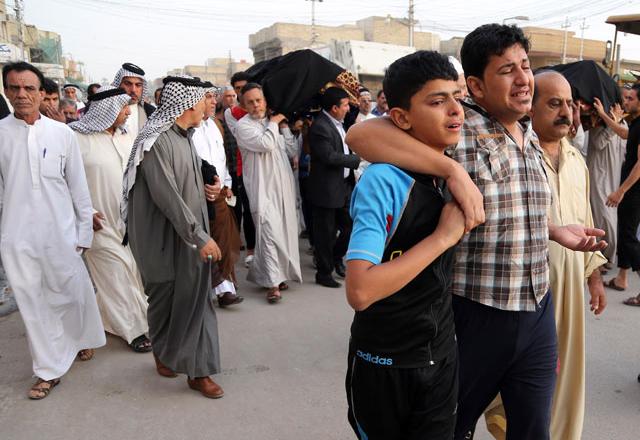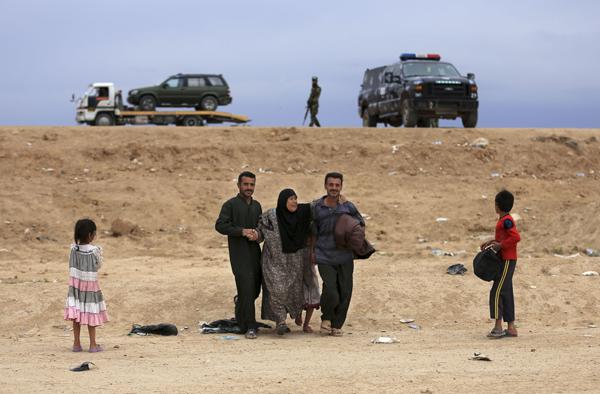You are here
Worried Iraqi capital sees militant push around it
By AP - Oct 11,2014 - Last updated at Oct 11,2014
BAGHDAD — On the western edge of Iraq's capital, Islamic State (IS) militants battle government forces and exchange mortar fire, only adding to the sense of siege in Baghdad despite air strikes by a US-led coalition.
Yet military experts say the Sunni militants of IS, who now control a large territory along the border that Iraq and Syria share, won't be able to fight through both government forces and Shiite militias now massed around the capital.
It does, however, put them in a position to wreak havoc in Iraq's biggest city, with its suicide attacks and other assaults further eroding confidence in Iraq's nascent federal government and its troops, whose soldiers already fled the IS’ initial lightning advance in June.
"It's not plausible at this point to envision ISIL taking control of Baghdad, but they can make Baghdad so miserable that it would threaten the legitimacy of the central government," said Richard Brennan, an Iraq expert with RAND Corporation and former Department of Defence policy maker, using another acronym for IS.
The siege fears in Baghdad stem from recent gains made by IS in the so-called Baghdad Belt — the final stretch between Anbar province, where the group gained ground in Janaury, and Baghdad. The group has had a presence in the Baghdad Belt since spring, Iraqi officials say, but recent advances have sparked new worries.
Last week, IS fighters seized the towns of Hit and neighbouring Kubaisa, sending Iraqi soldiers fleeing and leaving a nearby military base with its stockpile of weapons at risk of capture.
The US-led coalition recently launched two air strikes northwest of Hit, US Central Command said Saturday.
Government forces still control most of the Anbar provincial capital of Ramadi, but the city is vulnerable.
Perhaps most worrying, IS fighters now battle Iraqi forces in Abu Ghraib, the town home to the infamous prison of the same name that’s only 29 kilometres from the Green Zone, the fortified international zone protecting Baghdad-based embassies and government offices.
A senior military official in Anbar told The Associated Press on Saturday that government helicopters fire on targets daily in Abu Ghraib, though the town remains in the hands of security forces.
To the south of Baghdad, security forces fight to hold onto the town of Jurf Al Sukr, and to the north, one Sunni tribe has held onto the town of Duluiyah despite an IS‘ onslaught. However, IS fighters have taken over a number of towns in Diyala province, east of Baghdad.
Yet authorities believe an assault to take Baghdad remains unlikely. An Iraqi military and intelligence official each told the AP that as many as 60,000 government security personnel, including soldiers and police officers, are currently in position outside the city along the Baghdad Belt. A plot by the IS to enter Baghdad in September through the Shiite Al Kazimiyah neighbourhood was foiled, the officials added.
Iraqi officials say that at least 1 million men make up the military and police forces in the country, though US officials say that figure is grossly exaggerated. According to one senior US military official, who spoke anonymously as he’s not authorised to brief the media, the Iraqi military had strength of about 205,000 soldiers in January. Today, that number is under 125,000 men, he said.
Both the US and Iraqi officials spoke on condition of anonymity as they were not authorised to speak to journalists.
Since that initial September assault, Baghdad largely has been spared and remained relatively calm, considering the intense sectarian bloodshed residents saw in 2006 and 2007 after the US-led invasion to topple Saddam Hussein. Still, many remain worried.
“It’s scary,” said Maha Ismail, who recently visited one of Baghdad’s new shopping malls. “But we have seen a lot worse than this so we are gathering despite all the warnings.”
A US counterterrorism official who spoke to the AP said Baghdad would remain a target for IS attacks, though seizing it outright would be nearly impossible.
“Attacking Baghdad is probably still in [its] playbook but its leaders must know they would face overwhelming odds in striking the city,” the US official said, speaking on condition of anonymity as he was not authorised to talk to journalists.
IS says it has a foothold inside Baghdad, having claimed responsibility for a number of attacks in the city, particularly in the Sadr City neighbourhood — a Shiite stronghold. In August, the group claimed responsibility for an attack on a Shiite mosque in New Baghdad, and another in the Shiite-majority district of Utaifiya in Baghdad, which together killed 26 people.
Yet analysts, like Brennan from the RAND Corporation, say capturing Baghdad remains beyond the IS’ ability. At its worst, the group might “start pressing into the western areas of Baghdad, going into the Sunni areas of Baghdad and pressing up against the Tigris [River] — if not controlling it, then at least testing the control of the central government,” he said.
At a recent news conference, Pentagon spokesman Rear Adm. John Kirby also said Baghdad is protected.
“Air strikes around the city, particularly to the south and to the southeast of the city, we believe, have been effective in blunting” the IS, he said.
Beyond the US-coordinated air strikes and the massing of Iraqi troops, the country’s religious and ethnic lines likely will staunch any advance by the Sunni militants of the IS. From Baghdad further south, Iraq’s population is overwhelmingly Shiite and the lands there are home to some of its most important shrines.
Already, Shiite militias back up government forces in Baghdad and elsewhere in Iraq — their flags and symbols provocatively displayed across the capital. Such militias, like Iran-supported Asaib Ahl Al Haq and Moqtada Al Sadr’s Mehdi Army, “are battle tested,” said David L. Phillips, the director of the Peace-building and Rights Programme at Columbia University. Challenging them likely would become a bloody slog for the IS, he said.
“The militias are not bound by rules of war,” he added. “They and [the IS] share one thing in common: Neither is bound by the Geneva Conventions.”
Related Articles
Militants with the Islamic State (IS) on Monday captured a military training camp in western Iraq, inching closer to full control of the restive Anbar province, as a spate of deadly bombings shook Baghdad, hitting mostly Shiite neighbourhoods and leaving at least 30 dead.
BAGHDAD — Iraqi forces retook the town of Heet from the Daesh terror group on Thursday after weeks of fighting, the military said, the lates
BAGHDAD — A twin suicide bombing claimed by the Daesh terror group killed 70 people in a Shiite district of Baghdad on Sunday in the deadlie













